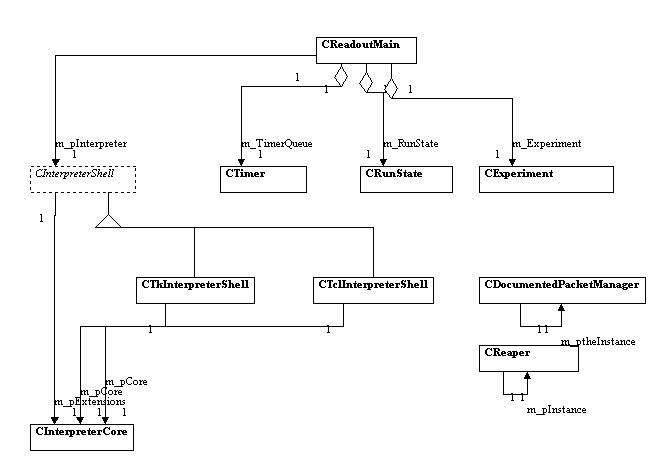 |  |  | Major classes and objects |  |
Major classes and objects
Several majore classes and objects (instances) of those classes are
described in this section. Knowing your way around these classes
helps you both to understand the way the readout program works
as well as how to extend it. This section will also describe:
- How to locate the key objects.
- Major member functions for each of the classes.
For detailed reference information on the software, see
the Doxygen documentation of they software referenced
in Reference documentation for the internals of Readout.
The figure below shows the major classes and their relationships:
Major class relationships

- CReadoutMain is a singleton object. Its operator()
gets initial control. Note that usually, you will override
this class to tailor its virtual functions (see
Modifiying the Readout skeleton).
CReadoutMain's member functions allow you to get
pointers to the instances of the classes it contains:
- CTimer& getClock()
Returns a reference to the clock manager. The
clock manager runs when the run is active and
is a scheduler of timed events.
- CRunState* getRunState()
Returns a pointer to the run state object. The run state
object encapsulates the state machine that
describes the current state of the run and
allowed state transitions. See:
System State Machine.
- CExperiment* getExperiment()
Returns a pointer to the experiment. The experiment
object houses all of the functionality of the experiment itself,
divorced from the flow control, command processing and so
forth.
- CInterpreterShell* getInterpreter()
Returns a pointer to the Interpreter shell object. This will
actually be either a CTkInterpreterShell or a CTclInterpreterShell.
Each of these classes doubly inherits from CInterpreterShell and
from CInterpreterStartup. CInterpreterStartup gives Interpreter
shells the behavior of a guest event loop running Tcl or Tk.
While CInterpreterShell gives the property of holding a core set
of common interpreter extensions regardless of whether or not
the underlying interpreter is a Tcl or Tk interpreter.
- CTimer is a class that manages timed events. The
CReadoutMain class/objects maintains one of these for use by
the experiment. When the run is active, this timer is "turned on",
and starts scheduling events. Normally the experiment will register
a scaler trigger that will fire periodically to read out run time
scalers. Major function of CTimer are:
- void Start(int ms, bool reset=false)
Enables the timer
to schedule events. ms is the timer resolution in
milliseconds. The timer will wake up every ms and
check for events that have come due. reset
should be set true if you want the object's concept of elapsed
time to be reset to zero.
- void Stop() Disables the timer. The timer
will no longer schedule events.
- int GetElapsedTime() Returns the elapsed
time in milliseconds.
- void EstablishEvent(CTimedEvent& rEvent
Adds the object rEvent to the list of items that
the timer will periodically schedule.
- CRunState Run state objects encapsulate the state machine
that defines legal transitions between states of the run and the
current state as well. Major functions are:
- CRunState::RunState getState()
Returns the current state. The CRunState::RunState
data type is an enumerated data type with values:
Inactive, Active, or Paused.
- bool Allowed(CRunState::RunState NewState
Returns true if it is now legal to make a transition
to the state NewState, false if not. note as
well that the state transition functions described below
also throw a CBadTransition exception if the transition is
not legal.
- void Begin() Transition to the Active state.
- void End() Transition to the Inactive state.
- void Pause() Transition from Active to
Paused.
- void Resume() Transition from Paused to
Active.
- string getStateName() Returns a string
version of the name of the state.
- CExperiment is a class that contains configuration
information and functions relelvant to the experiment itself. Major
member functions include:
- void AddEventSegment(CEventSegment* pSegment)
Adds an event segment to the readout. For more about
event segments, see:
How to structure your readout.
- void RemoveEventSegment(CEventSegment* pSegment)
Removes an event segment from the readout.
For more about
event segments, see:
How to structure your readout.
- void EstablishTrigger(CTrigger* pTrigger)
Replaces the current trigger object with a new one. Trigger modules
supply a mechanism to watch for the event readout trigger. For more
about the CTrigger class, see:
Specifying a trigger.
- void EstablishBusy(CBusy* pBusy)
Replaces the current Busy management object with a new one.
The CBusy object provides a mechanism to manage the
computer busy signal required by experimental electronics.
For more about the CBusy class, see:
Specifying a busy manager.
- void AddScalerModule(CScaler* pScaler)
Adds a scaler module to the list of modules that will be read
on a scaler trigger. Note that CScalerBank is derived from
CScaler so you can hierarchically organize the readout.
- void RemoveScalerModule(CScaler* pScaler)
Removes an existing scaler module from the scaler readout.
- CInterpreterShell encapsulates the Tcl or Tk interpreter
relevant to the readout system. Complete coverage of the
Tcl/Tk interpreter structure will be given in several sections
of Tailoring the software.
The main functions you will need is
CInterpreterCore* getInterpreterCore()
which gets the interpreter core. The interpreter core object
is the set of extensions that Readout has layered on to
the base Tcl/or Tk interpreter, and CTCLInterpreter&
Interp() which gets the interpreter object
itself.
- CReaper monitors threads that must be deleted on exit.
Threads are normally objects of type derived from CEvent.
Deleting dynamically created CEvent objects is problematic as
it must be done by some `force' outside the thread itself.
CReaper is a singleton class that can be used to ensure that
dynamically created thread objects are deleted on exit. Key
member functions are:
- CReaper* getInstance()
Returns a pointer to the single reaper object.
- void Add(CEvent* pEvent)
Called by a thread on entry to add itself to the reapers
list of monitored processes.
A typical sequence of code might be:
CReaper::getInstance()->Add(this); // Auto delete on exit.
Report documentation errors to
Ron Fox
(fox@nscl.msu.edu)or
NSCL's Bugzilla page
 |  |  | Major classes and objects |  |



